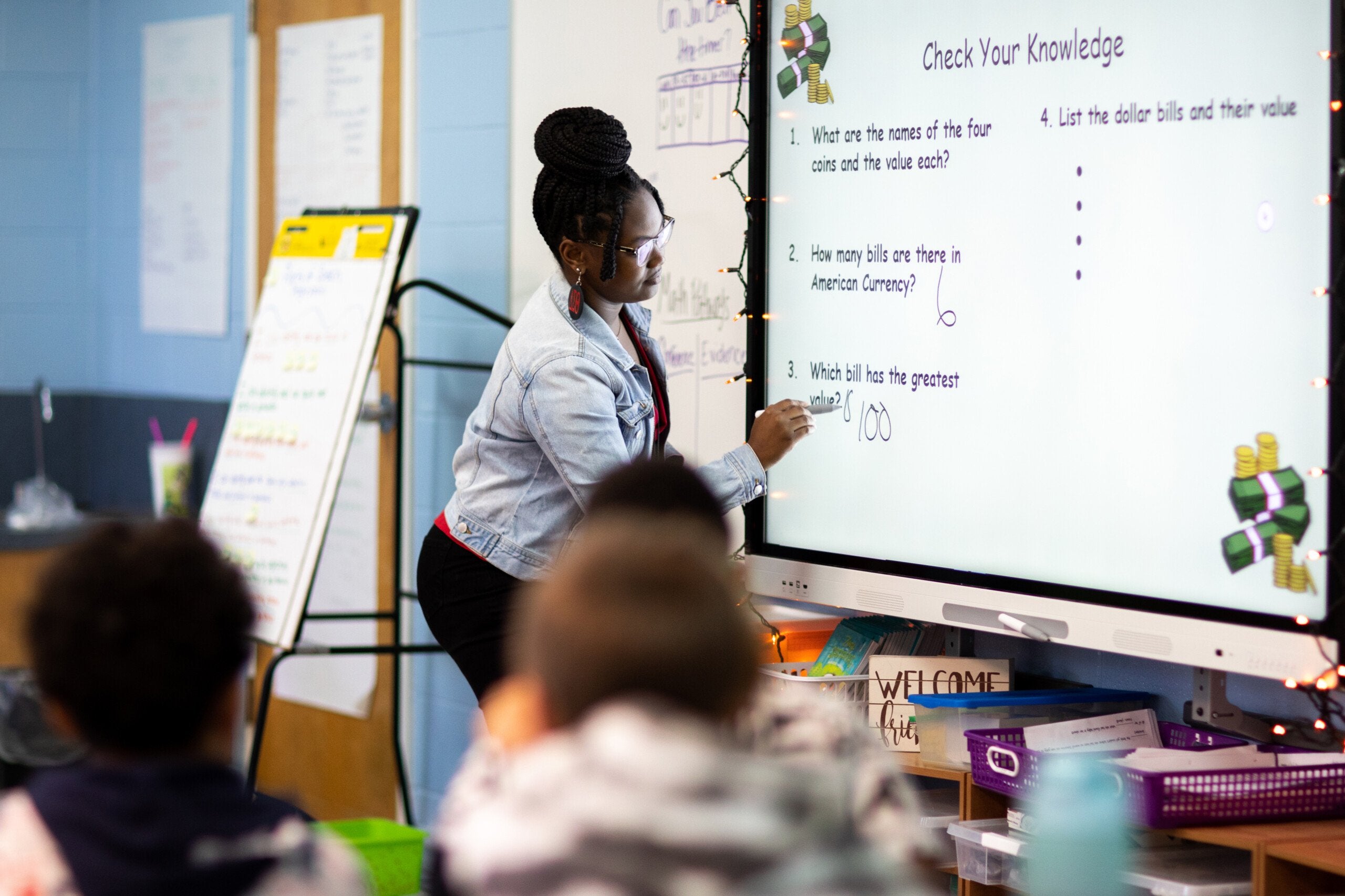As a child, Kinandah Williams ʼ22 bounced from idea to idea, wondering what career path she would follow in her adult life. Initially, she wanted to pursue a career as a pediatrician. Her passions later changed, and she thought of becoming a physical therapist or even a lawyer. But deep down she always recognized her true calling.
“I vividly remember lining my teddy bears up and always needing a whiteboard and dry-erase markers to teach them or my younger cousins,” recalls the elementary education major. “Eventually it turned into, ‘Oh, I’m going to go into education.’ I don’t see myself doing anything else.”
Williams, who graduated in December, is entering the field of education at a tough time in the profession. A National Education Association poll conducted in 2022 found 55% of teachers said they would leave education sooner than planned, and teacher shortages are being reported across the country as states and school districts grapple with issues of low teacher pay and burnout.
Williams says she is undeterred by the difficult classroom climate for three main reasons.

Kinandah Williams (Photos by Catie Cleveland)
“No. 1: Anything can be challenging, and every job will have its issues,” she says. “No. 2: Anything that comes easy is not worth having. And No. 3: we cannot up and leave the next generation. Someone must be willing. Someone must keep the faith – keep the courage. There will always be one student that serves as a constant reminder of the passion and drive I have for teaching, which pushes me to keep moving forward.”
A native of Greeleyville, South Carolina, Williams is a proud graduate of C.E. Murray High School. She recalls many challenges in her school district due to issues with recruiting and retaining teachers – but that only further drove her passion for education.
“The teacher shortage has grown tremendously, and unfortunately, I watched it unfold before my eyes. But I said, ‘I want to be a part of the solution,’” she says. “Great educators are essential.”
Perfecting effective classroom management takes time and calls for constant monitoring and adjusting. As a student teacher in the fall of 2022 at College Park Elementary School in Ladson, South Carolina, Williams found that building positive relationships with the third and fourth graders in her class was an essential part of her success in developing effective classroom management strategies. Though at times challenging, she says, working with her cooperating teacher to develop an understanding of each student made a huge difference in her approach to classroom management and relationship building.
Tracey Hunter-Doniger, associate professor and chair of the Department of Teacher Education, says the goal is to provide education majors with professional development opportunities, including opportunities to work in a classroom, before they begin student teaching so they know what they’re getting into. The College’s Center for Partnerships to Improve Education provides future educators with even more access to professional development through programs such as paid summer research and student group grants to support education-related community initiatives.
Williams was among the College’s education majors who benefited from hands-on experience prior to student teaching, including facilitating art projects with local elementary school students as part of Hunter-Doniger’s First Year Experience class, The Art of Teaching. She also did summer research with Hunter-Doniger alongside six other students investigating diversity in education, which was published in the Teacher Education Journal of South Carolina. And at the urging of Hunter-Doniger, Wiliams applied for and got a job as a teacher assistant at the College’s N.E. Miles Early Childhood Development Center, where she worked for a year and a half helping support a class of 3-year-olds and then pre-kindergarten and kindergarten students.
Those experiences have helped prepare her for the rigors of being in the classroom every day. “I feel supported,” says Williams, who already had a fourth-grade teaching job lined up before she graduated.
And that’s the point, says Hunter-Doniger, of building up education majors’ skills. “When I see that passion, I just want to nurture it,” she says, adding that Williams is a “natural born teacher.”
With her teaching degree in hand, Williams is ready to teach more than just her teddy bears.
Optimistic Outlook
Although school districts across the country and throughout South Carolina are experiencing teacher shortages, there are signs of optimism. The School of Education reports an increase in enrollment in its undergraduate elementary education program. The number of elementary education majors has increased by 25% over the last two years – from 142 students in 2020 to 178 in 2022.
Interest in teaching has also grown among adult students who are ready to make a career change. Enrollment in the Master of Arts in Teaching programs for elementary education and early childhood education has more than doubled over the last few years to a combined 37 graduate students in the fall of 2022.
That upward trend is also reflected in the school’s cohort of 26 teaching fellows for the 2022–23 academic year – the largest freshman cohort the Department of Teacher Education has seen in many years. The Teaching Fellows Program is a statewide program that provides support, professional development and scholarships to college students pursuing degrees leading to teaching certification.
In all, the school estimates it will graduate more than 140 new teachers during the 2022-23 academic year. “The trends look really good,” says Frances Welch, dean of the Schoolof Education. “This generation wants to make a difference – and what better way to make a difference than be a teacher?” – A.K.




